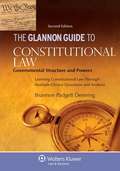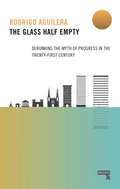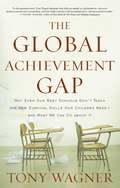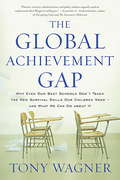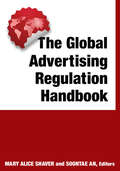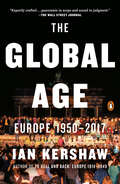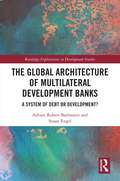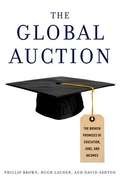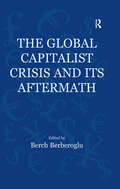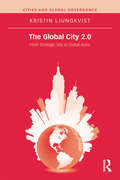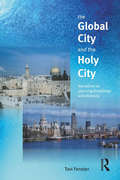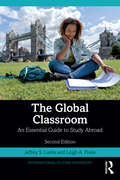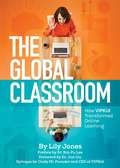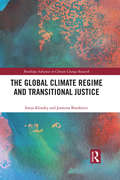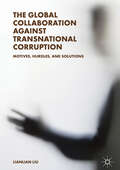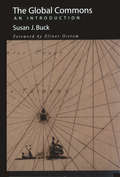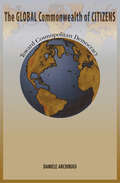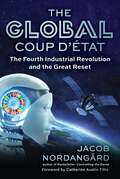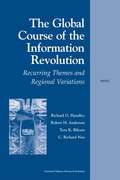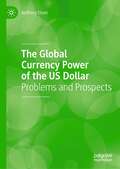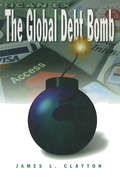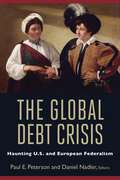- Table View
- List View
The Glannon Guide to Constitutional Law: Governmental Structure and Powers Learning Constitutional Law Through Multiple-Choice Questions and Analysis (Second Edition)
by Brannon Padgett DenningThe proven Glannon Guide is a user-friendly study aid to use throughout the semester as a great supplement to (or substitute for) classroom lecture. Topics are broken down into manageable pieces and are explained in a conversational tone. Chapters are interspersed with hypotheticals like those posed in the classroom that include analysis of answers to ensure thorough understanding. Additionally, "The Closer" questions pose sophisticated hypotheticals at the end of each chapter to present cumulative review of earlier topics. More like classroom experiences, the Glannon Guide provides you with straightforward explanations of complex legal concepts, often in a humorous style that makes the material stick. The user-friendly Glannon Guide is your proven partner throughout the semester when you need a supplement to (or substitute for) classroom lecture.
The Glass Half-Empty: Debunking the Myth of Progress in the Twenty-First Century
by Rodrigo AguileraDespite the doom and gloom of financial crises, global terrorism, climate collapse, and the rise of the far-right, a number of leading intellectuals (Steven Pinker, Hans Rosling, Johan Norberg, and Matt Ridley, among others) have been arguing in recent years that the world is getting better and better. But this &“progress narrative&” is little more than a very conservative defence of the capitalist status quo. At a time when liberal democracy appears incapable of stemming the tide of the far-right populism, and when laissez-faire capitalism is ill-equipped to deal with socio-economic problems like climate change, inequality, and the future of wok, the real advocates of progress are those willing to challenge these established paradigms. The Glass Half-Empty argues that, without criticising the systems of capitalism, the changes needed to make a better world will always fall short of our expectations. The "progress narrative" needs to be challenged before we stumble into a potentially catastrophic future, despite having the means to build a truly better world.
The Global 1989
by Michael Cox George Lawson Chris Armbruster1989 signifies the collapse of Soviet communism and the end of the Cold War, a moment generally recognized as a triumph for liberal democracy and when capitalism became global. The Global 1989 challenges these ideas. An international group of prominent scholars investigate the mixed, paradoxical and even contradictory outcomes engendered by these events, unravelling the intricacies of this important moment in world history. Although the political, economic and cultural orders generated have, for the most part, been an improvement on what was in place before, this has not always been clear cut: 1989 has many meanings, many effects and multiple trajectories. This volume leads the way in defining how 1989 can be assessed both in terms of its world historical impact and in terms of its contribution to the shape of contemporary world politics.
The Global Achievement Gap
by Tony WagnerIn The Global Achievement Gap, education expert Tony Wagner situates our school problems in the larger context of the demands of the global knowledge economy. With insights gained from visits to classrooms in leading suburban schools, he analyzes performance by considering the skills needed to get a good job and become a productive citizen. Highlighting discussions with young people and the adults who work with them, Wagner also explains the ways in which today's generation is differently motivated to excel. A manifesto for the twenty-first century,The Global Achievement Gap is a must-read for anyone interested in seeing our young people achieve their full potential.
The Global Achievement Gap: Why Even Our Best Schools Don’t Teach the New Survival Skills Our Children Need—and What We Can Do About It
by Tony WagnerIn "The Global Achievement Gap," education expert Tony Wagner situates our school problems in the larger context of the demands of the global knowledge economy. With insights gained from visits to classrooms in leading suburban schools, he analyzes performance by considering the skills needed to get a good job and become a productive citizen. Highlighting discussions with young people and the adults who work with them, Wagner also explains the ways in which todayOCOs generation is differently motivated to excel. A manifesto for the twenty-first century, "The Global Achievement Gap" is a must-read for anyone interested in seeing our young people achieve their full potential.
The Global Achievement Gap: Why Our Kids Don't Have the Skills They Need for College, Careers, and Citizenship -- and What We Can Do About It
by Tony Wagner"In this persuasive book, Wagner delineates what skills are needed in a globalized era, why most American schools can’t nurture them, and how today’s schools could be transformed to cultivate tomorrow’s skills. ”--Howard Gardner
The Global Advertising Regulation Handbook
by Mary Alice Shaver Soontae AnAdvertising is an important and visible component of marketing, competition, and consumer awareness. As many companies grow and expand to serve multinational audiences worldwide, there is a concomitant need to understand culture, customs and regulation in the world markets. Not only businesses but consumers and students as well need to understand the workings of advertising and its regulation in worldwide markets.This book is designed to fill this need for students and professionals. The book takes a thorough and critical view of the process in 21 countries, representing four continents of developed countries.An important feature of this handbook is the consistent, carefully plotted format of each chapter, facilitating easy access to key information. For each country, the chapters cover the following:form of governmenthistory of regulation along with current operating regulation systemsroute/manner in which cases are brought forward to regulating bodiesadvertising codes, if any, and how they workamount of money spent on advertising by yearconsumerism and its role in advertisingspecific regulation of advertising to children, health advertising and tobacco advertisingsanctions and control of advertising found inadmissibleposition of commercial speech in country--if anyCountries included are Argentina, Australia, Canada, Chile, China/Hong Kong, Colombia, Belgium, Brazil, Denmark, Finland, France, Japan, Korea, Mexico, Peru, Portugal, Spain, Sweden, the United States, and the United Kingdom.Each chapter's contributing author is a known expert in advertising with a particular insight on that country's language, culture, and advertising industry.
The Global Age: Europe 1950-2017 (The Penguin History of Europe)
by Ian KershawThe final chapter in the Penguin History of Europe series from the acclaimed scholar and author of To Hell and BackAfter the overwhelming horrors of the first half of the twentieth century, described by Ian Kershaw in his previous book as being 'to Hell and back,' the years from 1950 to 2017 brought peace and relative prosperity to most of Europe. Enormous economic improvements transformed the continent. The catastrophic era of the world wars receded into an ever more distant past, though its long shadow continued to shape mentalities.Yet Europe was now a divided continent, living under the nuclear threat in a period intermittently fraught with anxiety. There were, by most definitions, striking successes: the Soviet bloc melted away, dictatorships vanished, and Germany was successfully reunited. But accelerating globalization brought new fragilities. The interlocking crises after 2008 were the clearest warnings to Europeans that there was no guarantee of peace and stability, and, even today, the continent threatens further fracturing. In this remarkable book, Ian Kershaw has created a grand panorama of the world we live in and where it came from. Drawing on examples from all across Europe, The Global Age is an endlessly fascinating portrait of the recent past and present, and a cautious look into our future.
The Global Architecture of Multilateral Development Banks: A System of Debt or Development? (Routledge Explorations in Development Studies)
by Susan Engel Adrian Robert BazbauersThis book explores the evolution of the 30 functioning multilateral development banks (MDBs). MDBs have their roots in the growing system of international finance and multilateral cooperation, with the first recognisable MDB being proposed by Latin America in financial cooperation with the US in the late 1930s. That Inter-American Bank did not eventuate but was a precursor to the World Bank being negotiated at Bretton Woods in 1944. Since then, a complex network of regional, sub-regional, and specialised development banks has progressively emerged across the globe, including two significant recent entrants established by China and the BRICS. MDBs arrange loans, credits, and guarantees for investment in member states, generally with the stated aim of fostering economic growth. They operate in both the Global North and South, though there are more MDBs focusing on emerging and developing states. While the World Bank and some of the larger regional banks have been scrutinised, little attention has been paid to the smaller banks or the overall system. This book provides the first study of all 30 MDBs and it evaluates their interrelationships. It analyses the emergence of the MDBs in relation to geopolitics, development paradigms and debt. It includes sections on each of the banks as well as on how MDBs have approached the key sectors of infrastructure, human development, and climate. This book will be of particular interest to researchers of development finance, global governance, and international political economy.
The Global Auction: The Broken Promises of Education, Jobs, and Incomes
by David Ashton Phillip Brown Hugh LauderFor decades, the idea that more education will lead to greater individual and national prosperity has been a cornerstone of developed economies. Indeed, it is almost universally believed that college diplomas give Americans and Europeans a competitive advantage in the global knowledge wars. Challenging this conventional wisdom, The Global Auction forces us to reconsider our deeply held and mistaken views about how the global economy really works and how to thrive in it. Drawing on cutting-edge research based on a major international study, the authors show that the competition for good, middle-class jobs is now a worldwide competition--an auction for cut-priced brainpower--fueled by an explosion of higher education across the world. They highlight a fundamental power shift in favor of corporate bosses and emerging economies such as China and India, a change that is driving the new global high-skill, low-wage workforce. Fighting for a dwindling supply of good jobs will compel the middle classes to devote more time, money, and effort to set themselves apart in a bare-knuckle competition that will leave many disappointed. The authors urge a new conversation about the kind of society we want to live in and about the kind of global economy that can benefit workers, but without condemning millions in emerging economies to a life of poverty. The Global Auction is a radical rethinking of the ideas that stand at the heart of the American Dream. It offers a timely exposé of the realities of the global struggle for middle class jobs, a competition that threatens the livelihoods of millions of American and European workers and their families.
The Global Capitalist Crisis and Its Aftermath: The Causes and Consequences of the Great Recession of 2008-2009 (Globalization, Crises, and Change)
by Berch BerberogluWritten by a team of experts on the contemporary global capitalist political economy who are able to shed light on the inner workings of global capitalism and the capitalist globalization process that has led to the growth and development of capitalism from the national to the global level, this groundbreaking volume provides critical analyses of the causes and consequences of the Great Recession of 2008-2009. Through a careful examination of the origin, development and aftermath of the catastrophic economic crisis from which the world is still trying to recover, editor Berch Berberoglu and his colleagues demonstrate that those most responsible for the economic collapse are the ones least affected by its devastating impact felt most severely by working people around the world. Ultimately, this book argues that it is only through the systematic restructuring of the world economy by the working class that society will be able to prevent the boom and bust cycle of global capitalist crises and usher in a more egalitarian socialist economy and society.
The Global City 2.0: From Strategic Site to Global Actor (Cities and Global Governance)
by Kristin LjungkvistGlobal cities all over the world are taking on new roles as they increasingly participate directly and independently in international affairs and global politics. So far, surprisingly few studies have analyzed the role of the Global City beyond its already well explicated role in the globalized economy. How is it that local governments of Global Cities claim international political authority and develop what appears to be their own independent foreign and security policies despite the fact that such policy areas have traditionally been considered to be the core function of nation-states and central governments? What does it mean to be and to govern the contemporary Global City? In this book Kristin Ljungkvist claims that we can better understand why local governments find it to be in their Global City’s interest to claim international political authority by exploring how the city’s role in the globalized world is constructed and narrated locally. A core claim is that Global City-hood as a specific type of collective identity can play a constitutive part in such interest formation. Combining insights from International Relations and Urban Studies scholarship, and with the help of a case study on New York City, Ljungkvist develops a new analytical framework for studying the Global City as an international political actor. The Global City 2.0 shows that even as the Global City engages in various global issues such as global environmental governance or counterterrorism, such pursuit will be framed and rationalized in terms of the city’s economic growth. The quest for growth and global competitiveness are not necessarily the only available meanings attached to the being and governing of the contemporary Global City. However, there seems to be a remarkable persistency and attraction in economistic ideas and an economistic conception of the Global City.
The Global City and the Holy City: Narratives on Knowledge, Planning and Diversity
by Tovi FensterThe Global City & the Holy City explores the local embodied knowledge of women and men of different national, cultural and ethnic identities and age groups, living in London and Jerusalem. Their narratives focus on the three main concepts of Comfort, Belonging and Commitment to the various spaces in which they live. By deconstructing the meanings of these three notions and analyzing their expression in cognitive temporal maps, The Global City & The Holy City examines the practicalities of incorporating this kind of local embodied knowledge into the professional planning and management of cities in the age of globalization.
The Global Classroom: An Essential Guide to Study Abroad (International Studies Intensives)
by Jeffrey S. Lantis Leigh A. PooleThe Global Classroom: An Essential Guide to Study Abroad (Second Edition) is a unique international studies text that provides students and practitioners with valuable resources for success in education abroad.The Global Classroom addresses the challenges and opportunities of study abroad by encouraging participants to think about their personal, academic, and professional goals during every step of the process. Not only does it address different ways that study abroad has been re-envisioned and strengthened in the post-pandemic world, it is also intentional in its design to speak to a variety of contemporary issues and concerns. For example, the book addresses many different audiences, including appealing to historically marginalized groups about the value of study abroad, and addressing the rights of LGBTQ+ individuals at home and abroad. It explores how social media has changed how we navigate “distance” in education abroad, and a new section offers resources for mental health at home and abroad. Critically, the book also offers practitioners an academic, up-to-date, core text for pre-departure orientation programs and provides readers with tools to better link student preparation with considerations like safety, risk management, and response.
The Global Classroom: How VIPKID Transformed Online Learning
by Lily JonesBehind the Scenes of a Revolution in EducationIn 2013, Cindy Mi, a high school dropout turned English teacher, founded VIPKid with an innovative vision for education: facilitating personalized, one-on-one sessions with students and tutors from around the world. Six years later, her brainchild boasts a $3 billion valuation and connects approximately 500,000 students with 60,000 teachers worldwide. Thisis the story of a revolution in education.The Global Classroom takes readers inside the startup&’s history, educational innovation, and unprecedented success. With a foreword from Mi, the book takes a deep dive into a new educational model and investigates how the company&’s platform has diversified to serve the needs of students from countries across the globe. Readers will hear from VIPKid&’s executives, teachers, students, and parents as they discuss the company&’s values, its tangible success, and its impact on their lives.The Global Classroom is an inside look at the model for education in the 21st century and beyond.
The Global Climate Regime and Transitional Justice (Routledge Advances in Climate Change Research)
by Jasmina Brankovic Sonja KlinskyGeopolitical changes combined with the increasing urgency of ambitious climate action have re-opened debates about justice and international climate policy. Mechanisms and insights from transitional justice have been used in over thirty countries across a range of conflicts at the interface of historical responsibility and imperatives for collective futures. However, lessons from transitional justice theory and practice have not been systematically explored in the climate context. The comparison gives rise to new ideas and strategies that help address climate change dilemmas. This book examines the potential of transitional justice insights to inform global climate governance. It lays out core structural similarities between current global climate governance tensions and transitional justice contexts. It explores how transitional justice approaches and mechanisms could be productively applied in the climate change context. These include responsibility mechanisms such as amnesties, legal accountability measures, and truth commissions, as well as reparations and institutional reform. The book then steps beyond reformist transitional justice practice to consider more transformative approaches, and uses this to explore a wider set of possibilities for the climate context. Each chapter presents one or more concrete proposals arrived at by using ideas from transitional justice and applying them to the justice tensions central to the global climate context. By combining these two fields the book provides a new framework through which to understand the challenges of addressing harms and strengthening collective climate action. This book will be of great interest to scholars and practitioners of climate change and transitional justice.
The Global Collaboration against Transnational Corruption: Motives, Hurdles, and Solutions
by Lianlian LiuThis book articulates and explores the realities of contemporary international anti-corruption law. As corruption has increasingly become a major topic in international affairs, Liu analyzes the global collaboration against transnational bribery. As China's economic reforms are increasingly articulated in a language of law, governmentality, and anti-corruption, it is essential that scholars, policymakers and legal theorists around the world understand the issues at stake. In this elegant text, Liu lays out the issues clearly, establishes methodologies for analysis, and provides policy proposals for the years to come.
The Global Commons: An Introduction
by Elinor Ostrom Susan J. BuckVast areas of valuable resources unfettered by legal rights have, for centuries, been the central target of human exploitation and appropriation. The global commons -- Antarctica, the high seas and deep seabed minerals, the atmosphere, and space -- have remained exceptions only because access has been difficult or impossible, and the technology for successful extraction has been lacking. Now, technology has caught up with desire, and management regimes are needed to guide human use of these important resource domains.In The Global Commons, Susan Buck considers the history of human interactions with each of the global commons areas and provides a concise yet thorough account of the evolution of management regimes for each area. She explains historical underpinnings of international law, examines the stakeholders involved, and discusses current policy and problems associated with it.Buck applies key analytical concepts drawn from institutional analysis and regime theory to examine how legal and political concerns have affected the evolution of management regimes for the global commons. She presents in-depth case studies of each of the four regimes, outlining the historical evolution of the commons -- development of interest in exploiting the resource domain; conflicts among nations over the use of the commons; and efforts to design institutions to control access to the domains and to regulate their use -- and concluding with a description of the management regime that eventually emerged from the informal and formal negotiations.The Global Commons provides a clear, useful introduction to the subject that will be of interest to general readers as well as to students in international relations and international environmental law, and in environmental law and policy generally.
The Global Commonwealth of Citizens
by Daniele ArchibugiThe Global Commonwealth of Citizens critically examines the prospects for cosmopolitan democracy as a viable and humane response to the challenges of globalization. Arising after the collapse of the Soviet Union and the decisive affirmation of Western-style democracy, cosmopolitan democracy envisions a world politics in which democratic participation by citizens is not constrained by national borders, and where democracy spreads through dialogue and incentives, not coercion and war. This is an incisive and thought-provoking book by one of the world's leading proponents of cosmopolitan democracy. Daniele Archibugi looks at all aspects of cosmopolitan democracy in theory and practice. Is democracy beyond nation-states feasible? Is it possible to inform global governance with democratic norms and values, and if so, how? Archibugi carefully answers questions like these and forcefully responds to skeptics and critics. He argues that democracy can be extended to the global political arena by strengthening and reforming existing international organizations and creating new ones, and he calls for dramatic changes in the foreign policies of nations to make them compatible with global public interests. Archibugi advocates giving voice to new global players such as social movements, cultural communities, and minorities. He proposes building institutional channels across borders to address common problems, and encourages democratic governance at the local, national, regional, and global levels. The Global Commonwealth of Citizens is an accessible introduction to the subject that will be of interest to students and scholars in political science, international relations, international law, and human rights.
The Global Coup d'État: The Fourth Industrial Revolution and the Great Reset
by Jacob NordangårdWe are in the midst of a devastating takeover of our world. The Global Coup d'État shows how, why, and what we can do to stop it. The year 2020 will go down in history as the year when the global coup d'état was initiated. In a historical context, the COVID-19 crisis, the murder of George Floyd by a police officer and subsequent riots, mass protests against government lockdowns, and the 2020 election appear rather as part of a well-directed chess game, with complete control of the whole planet as the final goal. During the crescendo of this drama, the powers behind the coup emerged quite openly, offering a techno–totalitarian and very far-reaching solution to the world. This solution, which they call the Great Reset, means that mankind must be fully integrated and merged with a worldwide technological system, through the application of the technologies of the Fourth Industrial Revolution—all for our own safety, security, and well-being. Most people probably associate the phrase &“coup d'état&” with a sudden, violent takeover, with tanks around government buildings, takeover of media channels, purges of dissidents, arrests, and so on. But this is not always the case. The usurpers can also seize power without violence, in a completely legal and democratic way, with the consent or even enthusiasm of the people, as evidenced in 2020. There are many &“existential threats&” (climate crisis, refugee crises, terrorism, pandemics, etc.) that can be used to establish a firmer and more centralized governance. This can be a gradual process, barely perceivable until it&’s almost a fait accompli. In The Global Coup d'État, author and researcher Jacob Nordangård shares the history, describes the process, reveals the methods, and identifies the agents of this worldwide takeover so that we can take action before it is too late.
The Global Course of the Information Revolution
by C. Richard Neu Robert H. Anderson Tora K. Bikson Richard HundleyAdvances in information technology are heavily influencing ways in which business, society, and government work and function throughout the globe, bringing many changes to everyday life, in a process commonly termed the "information revolution." This book paints a picture of the state of the information revolution today and how it will likely progress in the near- to mid-term future (10 to 15 years), focusing separately on different regions of the world-North America, Europe, the Asia-Pacific region, Latin America, the Middle East and North Africa, and sub-Saharan Africa.
The Global Currency Power of the US Dollar: Problems and Prospects
by Anthony ElsonThis book explains how the US dollar serves as the primary reserve currency for the international financial system and assesses its prospects for the future. The book provides an analysis of the main factors that have given rise to the global currency power of the dollar and the key benefits that have accrued to both the United States and other countries from this arrangement. It then considers the growing costs that can be associated with the dollar-centered reserve system and the prospects for the medium-term in terms of its potential threats to global financial stability. In the light of these considerations, the book examines three alternative currency arrangements that could address some or all of the defects associated with the global currency power of the dollar. These include a shift to a multi-reserve currency system, an enhancement of the IMF’s role as an international lender of last resort and provider of global “safe” assets, and the introduction of central bank digital currencies.
The Global Debt Bomb
by James L. ClaytonWithin a historical perspective, Clayton clearly explains the "culture of debt" - its definition, how it got to be such a major burden, why we can't live without it, and ways to manage it more efficiently. He addresses the development of debt over the course of the 20th century in both the US and world economies. This comprehensive multidisciplinary analysis covers all aspects of debt - benefits and necessity; the impact (both good and bad) on individuals, corporations and governments; and lessons to be learned from the past. Clayton, drawing on current research and extensive primary data in economics, political science, and history, concludes that with our rapacious accumulation of debt and common-place use of "debt-finance", our society has set itself up for a significant financial decline.
The Global Debt Crisis
by Paul E. Peterson Daniel NadlerDebt crises have placed strains not only on the European Union's nascent federal system but also on the federal system in the United States. Old confrontations over fiscal responsibility are being renewed, often in a more virulent form, in places as far flung as Detroit, Michigan, and Valencia, Spain, to say nothing of Greece and Cyprus. Increasing the complexity of the issue has been public sector collective bargaining, now a component of most federal systems.The attendant political controversies have become the debate of a generation. Paul Peterson and Daniel Nadler have assembled experts from both sides of the Atlantic to break down the structural flaws in federal systems of government that have led to economic and political turmoil. Proposed solutions offer ways to preserve and restore vibrant federal systems that meet the needs of communities struggling for survival in an increasingly unified global economy.Contributors: Andrew G. Biggs (American Enterprise Institute); C sar Colino (National Distance Education University, Madrid); Elo sa del Pino (Instituto de Pol ticas y Bienes P blicos, Madrid); Henrik Enderlein (Hertie School of Governance, Berlin); Cory Koedel (University of Missouri); Carlos Xabel Lastra-Anad n (Harvard University); Daniel Nadler (Harvard University); Shawn Ni (University of Missouri); Amy Nugent (Government of Ontario, Canada); James Pearce (Mowat Centre, University of Toronto, Canada); Paul E. Peterson (Harvard University); Michael Podgursky (University of Missouri); Jason Richwine (Washington, D.C.); Jonathan Rodden (Stanford Uni versity); Daniel Shoag (Harvard University); Richard Simeon (University of Toronto, Canada); Camillo von M ller (University of St. Gallen, Switzerland, and Leuphana University, Germany); Daniel Ziblatt (Harvard University)
The Global Debt Crisis
by Paul E. Peterson Daniel NadlerDebt crises have placed strains not only on the European Union's nascent federal system but also on the federal system in the United States. Old confrontations over fiscal responsibility are being renewed, often in a more virulent form, in places as far flung as Detroit, Michigan, and Valencia, Spain, to say nothing of Greece and Cyprus. Increasing the complexity of the issue has been public sector collective bargaining, now a component of most federal systems.The attendant political controversies have become the debate of a generation. Paul Peterson and Daniel Nadler have assembled experts from both sides of the Atlantic to break down the structural flaws in federal systems of government that have led to economic and political turmoil. Proposed solutions offer ways to preserve and restore vibrant federal systems that meet the needs of communities struggling for survival in an increasingly unified global economy.Contributors: Andrew G. Biggs (American Enterprise Institute); César Colino (National Distance Education University, Madrid); Eloísa del Pino (Instituto de Políticas y Bienes Públicos, Madrid); Henrik Enderlein (Hertie School of Governance, Berlin); Cory Koedel (University of Missouri); Carlos Xabel Lastra-Anadón (Harvard University); Daniel Nadler (Harvard University); Shawn Ni (University of Missouri); Amy Nugent (Government of Ontario, Canada); James Pearce (Mowat Centre, University of Toronto, Canada); Paul E. Peterson (Harvard University); Michael Podgursky (University of Missouri); Jason Richwine (Washington, D.C.); Jonathan Rodden (Stanford Uni versity); Daniel Shoag (Harvard University); Richard Simeon (University of Toronto, Canada); Camillo von Müller (University of St. Gallen, Switzerland, and Leuphana University, Germany); Daniel Ziblatt (Harvard University)
